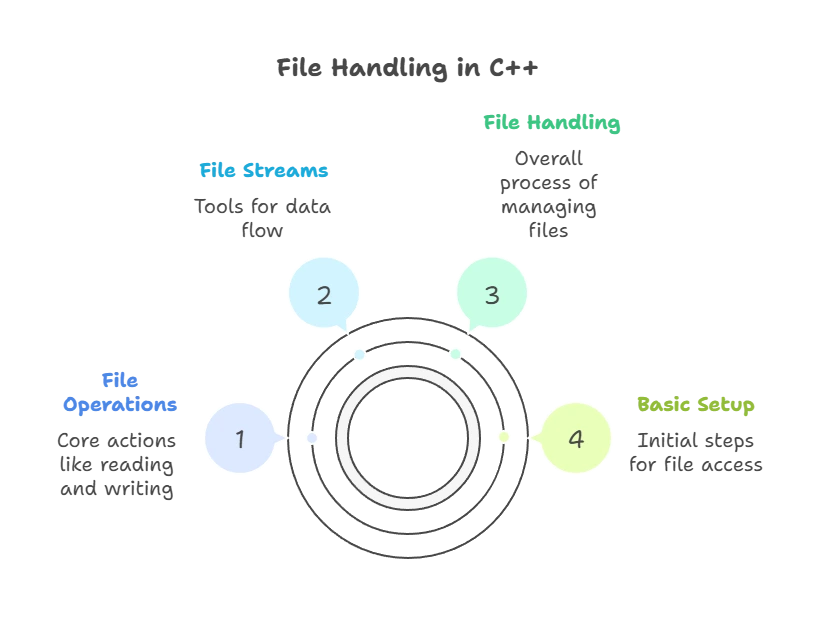File handling in C++ allows you to work with files on your computer's storage. You can read data from files, write data to files, and perform various operations like creating, opening, closing, and deleting files.
Basic File Operations
Opening a File
To work with a file in C++, you first need to open it. You can do this using the ifstream (input file stream) for reading and ofstream (output file stream) for writing.
#include <iostream>
#include <fstream>
int main() {
std::ifstream inFile; // Input file stream
inFile.open("example.txt"); // Open the file
// Check if the file is opened successfully
if (!inFile) {
std::cerr << "Unable to open file";
return 1; // Exit the program with an error
}
// File is opened successfully, you can now read from it
inFile.close(); // Don't forget to close the file when done
return 0;
}
Explanation:
- We include the necessary header files
<iostream>and<fstream>for input and output stream operations and file handling respectively. - An
ifstreamobjectinFileis declared to handle input operations. - We use the
open()member function to open the file named “example.txt” in the current directory. - Error handling is performed to check if the file is opened successfully. If not, an error message is displayed, and the program exits with a return code of 1.
- Once the file is successfully opened, operations like reading from it can be performed.
- Finally, the file is closed using the
close()member function.
Reading from a File
Once the file is successfully opened, you can read data from it. The most common way to do this is by using input stream operators (>>) to extract data from the file.
#include <iostream>
#include <fstream>
#include <string>
int main() {
std::ifstream inFile; // Input file stream object
inFile.open("example.txt"); // Open the file
if (!inFile) {
std::cerr << "Unable to open file";
return 1;
}
std::string data;
while (inFile >> data) { // Read data from file
std::cout << data << std::endl; // Output data to console
}
inFile.close(); // Close the file
return 0;
}
// output //
This
is
an
example
file.
Explanation:
- We continue with the file handling process by opening the “example.txt” file for reading.
- Inside the
whileloop, data is read from the file using the input stream operator>>. This reads the data word by word, separated by whitespace, and stores it in the string variabledata. - Each word read from the file is then printed to the console using
cout. - The loop continues until the end of the file is reached.
- Finally, the file is closed.
This output demonstrates that the contents of the “example.txt” file were successfully read and printed to the console, each word on a new line.
Writing to a File
Similarly, you can write data to a file using the ofstream class and output stream operators (<<).
#include <iostream>
#include <fstream>
int main() {
std::ofstream outFile; // Output file stream object
outFile.open("output.txt"); // Open (or create) the file named "output.txt"
if (!outFile) {
std::cerr << "Unable to create file";
return 1;
}
outFile << "Hello, world!\n"; // Write data to the file
outFile << "This is a new line.";
outFile.close(); // Close the file
return 0;
}
// output //
Hello, world!
This is a new line.
Explanation:
- Here, we use the
ofstreamobjectoutFileto handle output operations. - The
open()member function is used to create or open the file named “output.txt” in the current directory for writing. - Error handling checks if the file is created or opened successfully. If not, an error message is displayed, and the program exits with a return code of 1.
- Data is written to the file using the output stream operator
<<. In this case, we’re writing the string “Hello, world!\n” followed by “This is a new line.” to the file. - After writing the data, the file is closed using the
close()member function.
After running the program, you’ll find a file named “output.txt” in the same directory with the following content:

Advanced File Operations
Checking End-of-File (EOF)
You can check if you have reached the end of a file while reading from it using the eof() function.
#include <iostream>
#include <fstream>
#include <string>
int main() {
std::ifstream inFile;
inFile.open("example.txt");
if (!inFile) {
std::cerr << "Unable to open file";
return 1;
}
std::string data;
while (!inFile.eof()) {
inFile >> data;
std::cout << data << std::endl;
}
inFile.close();
return 0;
}
Appending to a File
You can append data to an existing file by opening it in append mode (std::ios::app).
#include <iostream>
#include <fstream>
int main() {
std::ofstream outFile;
outFile.open("output.txt", std::ios::app);
if (!outFile) {
std::cerr << "Unable to open file";
return 1;
}
outFile << "\nAppending new data.";
outFile.close();
return 0;
}
Reading and Writing Binary Files
In addition to text files, you can also work with binary files in C++. Binary files store data in a format that is not human-readable but is more efficient for certain types of data.
#include <iostream>
#include <fstream>
struct Person {
char name[50];
int age;
};
int main() {
Person p1 = {"John", 25};
// Writing to a binary file
std::ofstream outFile("people.bin", std::ios::binary);
outFile.write(reinterpret_cast<char*>(&p1), sizeof(Person));
outFile.close();
// Reading from a binary file
Person p2;
std::ifstream inFile("people.bin", std::ios::binary);
inFile.read(reinterpret_cast<char*>(&p2), sizeof(Person));
inFile.close();
std::cout << "Name: " << p2.name << ", Age: " << p2.age << std::endl;
return 0;
}
// output //
Name: John, Age: 25
File handling in C++ is a powerful feature that allows you to work with files effectively. You can read data from files, write data to files, and perform various operations on files. Understanding file handling is essential for many real-world applications where data needs to be stored and manipulated. Happy coding !❤️
